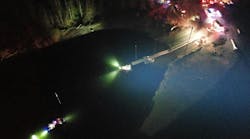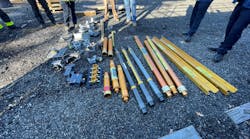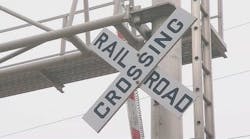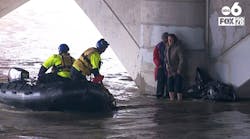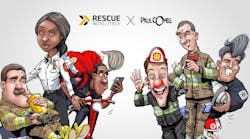May 09--When Rick Finney located the wreckage of Leo "Kent" Wingate's plane in a wooded area in rural Tennessee Wednesday afternoon and noticed that he was unconscious, Finney's military and firefighter training kicked in.
He smashed the plane's windshield, cleared Wingate's airway and cradled the Xenia resident's head in his arms.
"I told him, 'you're going to be alright. I'm here with you. I'm not leaving. Help's on the way. We're going to take care of you,'" Finney said Thursday as he recounted the rescue efforts during a telephone interview. "I was there with him for about 40 minutes holding him, and my arms just about completely give out."
The 1979 Piper Archer PA-28 Cherokee Wingate, 62, was flying ran out of fuel and crashed in some trees in a heavily-wooded area with rough terrain on the Hatchie River. Tipton County Sheriff J.T. "Pancho" Chumley said rescuers located the site by tracking the emergency signal the plane was transmitting. Wingate had taken off from the Dayton-Wright Brothers Airport in Miami Twp. Wednesday morning and was scheduled to land at Covington Municipal Airport inside of Lauderdale County, Tenn.
Officials at Regional One Health hospital in Memphis, Tenn. said Wingate suffered a collapsed lung and brain and leg injuries in the crash. He underwent surgery to repair his injuries. The retired U.S. Air Force administrator and current chairman of Sinclair Community College's aviation program was listed in critical condition Thursday evening.
"We are thankful that he is still alive," said Wingate's wife, Dr. Katherine Wingate. "It was due to the heroic efforts of the rescuers in Tipton County. A very heroic crop duster, who flew his plane to help rescue my husband, saved his life."
The search for Wingate -- who radioed the Covington, Tenn. airport to let them know he likely wouldn't land normally -- involved numerous law enforcement agencies. It was expedited by two crop dusters and a fisherman on the Hatchie River.
"It was a coordinated effort among a large group of people. He would not be alive today without their heroism," Dr. Wingate said. "I would like to thank the Dayton community for their prayers. Please continue to lift him up in prayers."
When Wingate failed to show up at the airport, law enforcement officials contacted 69-year-old Ben Baker, who owns a crop dusting business. Baker and others took off in his aircraft and a short time later found the emergency signal from Wingate's plane. That's when the 61-year-old Finney, whom Baker called "a pretty brave soul," joined the search.
Finney, a former soldier and firefighter who now works for Baker, landed his crop duster in a field near the river. From there, he waded through 3-feet of water, swam through some 6-feet of water and climbed onto a felled tree so he could flag down a fisherman on the river.
That fisherman, whose first name is also Rick (Finney doesn't know is last name), gave Finney a ride to the crash site and called 911 on his cell phone. Finney slogged through the swampy area, getting nicked by branches along the way.
"I went over to the cockpit and saw that he was breathing," said Finney, who said his military and firefighting training kicked in. "All this stuff came back to me like it was just yesterday."
Finney said he cut his hands several times while breaking out the windshield: "I leaned in, cut the seat belts off so I could reposition him so he could clear his airway and breath correctly," Finney said, adding that Wingate was bleeding from the mouth and ear. "It did not look hopeful, but I didn't want to quit.
"I'm an action guy. And there was a question, 'Is he alive or not?' You have to answer that," he said. "I had to be there to find that out. I made every effort that I could. I'm a little skinned up, but I'll be well in three days. He's having a struggle right now."
Although Wingate was unconscious, Finney said he talked to him while they waited for help to arrive: "I said you're going to be alright. Everything that should be attached is still attached. You're whole. You're not cut, but I know you have injuries."
Finney downplayed his actions. "It wasn't too heroic," he said. "I was there and knew what to do. That's all."
Baker said that's typical of a man who's been a pilot, firefighter, soldier, day trader, painting and roofing business owner and senior manager in corporate America.
"Rick is the kind of guy who didn't even want to get interviewed yesterday because he said he got his thanks yesterday from the people there," Baker said.
As for running out of fuel, Baker said he's never done it, but he has been close.
"He was facing a 15 mph or better headwind, so it slowed his ground time down a lot," Baker said. "He didn't miss it but by about a mile. It was very close. Those things happen. It's not a reflection on the pilot's capabilities or his integrity or anything. It's just one of those things. It's a regrettable thing."
Beyond the swampy, tree-filled area the plane crashed in was a field that Baker is certain Wingate was targeting: "If he could have glided another few seconds, he would have been over a field (and) he could have put it down on."
The National Transportation Safety Board provided data Thursday that shows there have been 328 general aviation accidents citing fuel exhaustion as a cause or factor from 2005 through February 2014.
Moraine Airpark flight instructor Tim Chrisman said pilots calculate the fuel needed for a trip plus a reserve, but added that something may have happened to make the plane run out of gas more quickly than anticipated.
"There could be a mechanical situation, just a plain old common fuel leak," Chrisman said. "There could be a weather situation that manifests itself in ways that will slow you down."
Copyright 2014 - Dayton Daily News, Ohio
